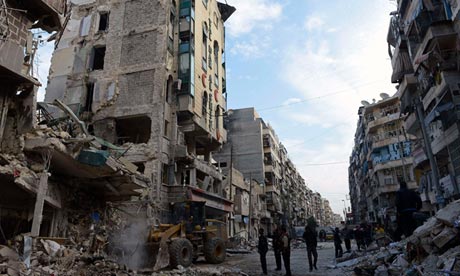الثوار يستولون على ثلاث قواعد عسكرية في أسبوع Syrian rebels capture three military bases in a week
Attacks yield large number of weapons, which
had been in short supply
·
Syrians
watch a bulldozer clear debris outside al-Shifa hospital in Aleppo, hit by a
bomb dropped from a jet. Photograph: Francisco Leong/AFP/Getty Images
Syrian rebels' success in seizing three
military bases in less than a week has underscored the growing difficulty faced
by Damascus in securing its outposts and stopping a rebel encroachment that has
claimed large swaths of the east and north of the country.
Attacks on the bases, one north-east of
Aleppo, a second at Mayedin in the far east and a third near Damascus, yielded
a large number of weapons, which had been in desperately short supply,
especially in positions across Syria's second city.
The impact of the new weapons seemed to have
been felt immediately along northern frontlines, where Kurdish groups loyal to
the Assad regime were on Friday engaged in their heaviest clashes yet with rebel
forces and jihadists, near the border town of Ras al-Ain.
Up to 30 fighters on both sides had been
killed by nightfall, with the battle expected to rage throughout the weekend. Rebels and
Kurdish groups clashed in Aleppo earlier this month but had
since struck a detente.
Each of the bases raided had been among the
last regime strongholds in their respective parts of the country and had in
effect become fortresses in hostile territory. Rebel fighters, using captured
regime soldiers as labourers, were seen carrying away hundreds of crates of
guns, medium-range weapons and ammunition.
All the while, the most formidable weapon in
the regime armoury – air force jets – were present in the skies nearby. The
regime's jet fleet of Russian-made MiGs has remained a lethal threat since they
were deployed in mid-summer shortly after opposition groups stormed both the
capital, Damascus, and Aleppo.
Their menace was emphasised yet again on
Wednesday when a bomb dropped from a jet scored a direct hit on the main
opposition-held al-Shifa hospital in the Shaar district of Aleppo, killing up
to 40 people.
Witnesses to the attack told the Guardian of
carnage inside the building, which is in the middle of a commercial and
residential district close to the centre of the city. They said the hospital
was no longer functional and that wounded civilians or rebel fighters must now
be treated in makeshift clinics.
Among the dead in al-Shifa were trauma
surgeons and specialists who had treated scores of casualties each day for the
past four months.
"It is a disaster what has happened
here," said a local vendor, Khaled Homsi, contacted by telephone.
"Did the [Israelis] do this in Gaza? Never. This is a terrible war crime
and it must be investigated by an international tribunal."
Syria's air force is in effect levelling the
battle field below, both with its bombs and its constant presence, which is
taking a psychological toll on rebel groups that can do little to nullify it.
Though in possession of a handful of looted anti-aircraft missiles as well as a
small number smuggled from Turkey, fighter jets remain the most dominant weapon
in the Syrian civil war.
Turkey this week said it would ask Nato to
provide it with batteries of Patriot missiles to reinforce its restive southern
border, where sporadic cross-border shelling has continued for much of the past
three months.
Nato has said it will consider the request
from one of its member states, in a move that has angered its cold war foe and
staunch Syrian ally, Russia. The move is seen by rebels as an attempt to keep
Syrian jets away from border areas.
Since the sustained border flare-up that
started in late September, Syrian jets have seldom been seen near the border.
However, they were active earlier in the month above the border town of Ras
al-Ain where Friday's clashes were taking place. Turkey did not respond at the
time.



تعليقات